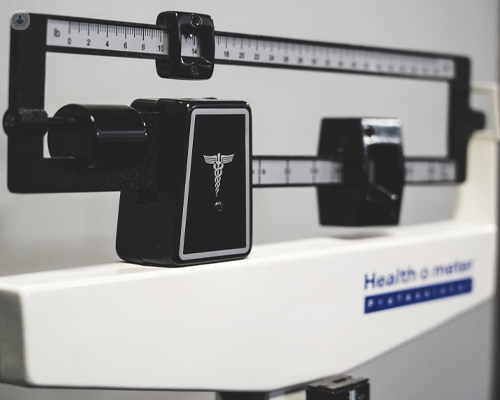Weight loss surgery from a bariatric perspective
Written in association with:Weight loss surgery comes under two medical umbrellas: plastic surgery and bariatric surgery. In this article, we’re looking at bariatric surgery and how weight loss surgery is done by experts in this specialty.
Leading consultant surgeon Mr Nagammapudur Balaji is here to go into expert detail about bariatric weight loss surgery.

What is weight loss surgery and how does it work?
With weight loss surgery, there are two very broad categories of what the general population think of.
Some go down the road of thinking weight loss surgery is about removing fat from the abdominal wall, or taking out bits of skin and fat from the abdominal wall, and hence taking out some amount of weight from the body, and then you get instant weight loss. That is one side, which is done by plastic surgeons.
To us, that is not weight loss surgery. That doesn't treat the problem which causes weight gain. Coming to the other side, which is non-plastic surgery and the operation which I and my colleagues do, what we call bariatric surgery, or weight loss surgery, is completely different.
The aim of the operation, is;
- to reduce the size of the stomach, and;
- to reduce the amount of food that the patient can eat, which means the intake has come down.
Sometimes we also do what we call 'bypass the food'. Normally the food goes from the food pipe into the stomach, and then it goes into the small intestine, travels about six metres, and then goes into the large intestine.
When we do a bypass, the stomach capacity is reduced, so the patient eats less. The food directly goes into the small intestine somewhere about two metres below where it would normally go. So, you're bypassing a bit of stomach and a part of the intestine.
How does this work? It works by reducing the amount of intake and in a bypass, it can cause mild malabsorption.
Who is eligible for weight loss surgery and what is the criteria?
We have certain criteria, which has been proposed by national and international organisations, and it's usually based on what we call BMI. BMI means body mass index. This is calculated by doing a calculation based on someone's height and weight. It's not just the BMI, it's the BMI along with some problems with the patient, because of their weight.
For example, the most common things are;
- diabetes;
- high blood pressure;
- high cholesterol;
- sleep apnoea;
- bad acid reflux.
Obesity, and weight regain, affects so many systems in the body. So, we take into account the BMI and the other problems that the patient might have, and then we follow nationally-accepted criteria to go for surgery.
The current criteria are BMI of over 40, with no medical problems. Or a BMI of 35 with some medical problems related to obesity.
However, in the past few months there have been some change in these criteria, but it isn't fully in place in the UK, yet. So, we go by BMI and medical problems.
What are the different types of weight loss surgeries available?
There's something called a gastric band. This is a band that goes around the upper part of the stomach, and reduces what the patient can eat. It's something that's becoming less accepted because it can create a lot of problems. However, it's still being performed by quite a few centres.
Then there is also a sleeve gastrectomy which is the most common operation done worldwide for bariatric surgery.
Then we have the bypass. These are the three types of surgeries, broadly. There are other types of surgeries, as well.
How does weight loss surgery impact a person's health and well-being?
In the initial period after surgery, regarding getting adapted to a new pattern of life; you're going to be eating things completely differently. There are three aspects to how we eat after bariatric surgery, or how one should eat after bariatric surgery:
Amount of food
So, people will only be able to eat less.
Being careful about what is eaten
Eating only healthy food and in a regular pattern.
Getting used to this itself might take a few weeks or months, and after that, as the weight loss kicks in it will be quite a lot. It's amazing. Then the rate of weight loss goes down over the year; it slowly reduces in intensity. By about a year and a half, it usually plateaus.
The weight loss results that people have is amazing, and they feel so good about it. It's not just about the weight loss. Quality of life isn't just about the weight.
People with diabetes, who've had diabetes for about 10 years or so, they come in and a good proportion of them stop their medicine the day after their surgery. That is amazing. We still don't know how exactly it works, but it works.
One year down the line, people who've had to wear masks for their sleep apnoea, they don't need them anymore. Their blood pressure is down, and their joint are better. So, it helps with a lot of things after surgery, and it also reduces the chances of someone developing cancer as well. The overall effects go much beyond just weight loss.
What is the typical weight loss expected after weight loss surgery?
We have some guidelines. Based on the initial formula I spoke about earlier; we go with what's called 'ideal body weight'. Let's give an example:
My height is 165 centimetres, so my ideal body weight, as a rough calculation is -100. Which will be about 65 kilograms. Let's just say I'm 100 kilograms, which means I'm 35 kilograms more than what I should be. My excess body weight is 35 kilograms. How much of these 35 kilograms will you lose after these different types of surgeries? It varies. If you do a sleeve gastrectomy, they say you can lose up to 50 to 60 per cent off those 35 kilograms. If you get a gastric bypass surgery, up to 70 per cent off those 35 kilograms, and some further procedures can achieve more.
It isn't something I would go by. For example, someone with a sleeve gastrectomy can lose the whole 35-kilogram excess, and someone with a gastric bypass might not necessarily lose that 70 per cent. These are average figures. Everything goes by your excess body weight, in comparison to what you should be. We take a percentage of that, averaging somewhere between 60 to 70 per cent of the excess body weight.
Have a query about gastric weight loss surgery? Arrange a consultation with Mr Balaji via his Top Doctors profile.


